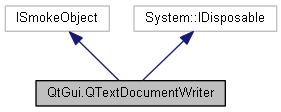|
Qyoto
4.0.5
Qyoto is a C# language binding for Qt
|
|
Qyoto
4.0.5
Qyoto is a C# language binding for Qt
|
The QTextDocumentWriter class provides a format-independent interface for writing a QTextDocument to files or other devices. More...


Public Member Functions | |
| QTextDocumentWriter () | |
| | |
| QTextDocumentWriter (QIODevice device, QByteArray format) | |
| | |
| QTextDocumentWriter (string fileName) | |
| | |
| QTextDocumentWriter (string fileName, QByteArray format) | |
| | |
| virtual void | CreateProxy () |
| new bool | Write (QTextDocument document) |
| | |
| new bool | Write (QTextDocumentFragment fragment) |
| | |
| new void | Dispose () |
Static Public Member Functions | |
| static System.Collections.Generic.List < QByteArray > | SupportedDocumentFormats () |
| | |
Protected Member Functions | |
| QTextDocumentWriter (System.Type dummy) | |
Protected Attributes | |
| SmokeInvocation | interceptor |
Properties | |
| new QTextCodec | Codec [get, set] |
| | |
| new QIODevice | Device [get, set] |
| | |
| new string | FileName [get, set] |
| | |
| new QByteArray | Format [get, set] |
| | |
| virtual System.IntPtr | SmokeObject [get, set] |
The QTextDocumentWriter class provides a format-independent interface for writing a QTextDocument to files or other devices.
To write a document, construct a QTextDocumentWriter object with either a file name or a device object, and specify the document format to be written. You can construct a writer and set the format using setFormat() later.
Call write() to write the document to the device. If the document is successfully written, this function returns true. However, if an error occurs when writing the document, it will return false.
Call supportedDocumentFormats() for a list of formats that QTextDocumentWriter can write.
Since the capabilities of the supported output formats vary considerably, the writer simply outputs the appropriate subset of objects for each format. This typically includes the formatted text and images contained in a document.
|
protected |
| QtGui.QTextDocumentWriter.QTextDocumentWriter | ( | ) |
Constructs an empty QTextDocumentWriter object. Before writing, you must call setFormat() to set a document format, then setDevice() or setFileName().
| QtGui.QTextDocumentWriter.QTextDocumentWriter | ( | QIODevice | device, |
| QByteArray | format | ||
| ) |
Constructs a QTextDocumentWriter object to write to the given device in the document format specified by format.
| QtGui.QTextDocumentWriter.QTextDocumentWriter | ( | string | fileName | ) |
Constructs an empty QTextDocumentWriter object. Before writing, you must call setFormat() to set a document format, then setDevice() or setFileName().
| QtGui.QTextDocumentWriter.QTextDocumentWriter | ( | string | fileName, |
| QByteArray | format | ||
| ) |
Constructs an empty QTextDocumentWriter object. Before writing, you must call setFormat() to set a document format, then setDevice() or setFileName().
|
virtual |
| new void QtGui.QTextDocumentWriter.Dispose | ( | ) |
|
static |
Returns the list of document formats supported by QTextDocumentWriter.
By default, Qt can write the following formats:
FormatDescription
plaintext Plain text
HTML HyperText Markup Language
ODF OpenDocument Format
See also setFormat().
| new bool QtGui.QTextDocumentWriter.Write | ( | QTextDocument | document | ) |
Writes the given document to the assigned device or file and returns true if successful; otherwise returns false.
| new bool QtGui.QTextDocumentWriter.Write | ( | QTextDocumentFragment | fragment | ) |
Writes the document fragment specified by fragment to the assigned device or file and returns true if successful; otherwise returns false.
|
protected |
|
getset |
Returns the codec that is currently assigned to the writer.
Sets the codec for this stream to codec. The codec is used for encoding any data that is written. By default, QTextDocumentWriter uses UTF-8.
|
getset |
Returns the device currently assigned, or 0 if no device has been assigned.
Sets the writer's device to the device specified. If a device has already been set, the old device is removed but otherwise left unchanged.
If the device is not already open, QTextDocumentWriter will attempt to open the device in QIODevice::WriteOnly mode by calling open().
Note: This will not work for certain devices, such as QProcess, QTcpSocket and QUdpSocket, where some configuration is required before the device can be opened.
|
getset |
If the currently assigned device is a QFile, or if setFileName() has been called, this function returns the name of the file to be written to. In all other cases, it returns an empty string.
Sets the name of the file to be written to fileName. Internally, QTextDocumentWriter will create a QFile and open it in QIODevice::WriteOnly mode, and use this file when writing the document.
|
getset |
Returns the format used for writing documents.
Sets the format used to write documents to the format specified. format is a case insensitive text string. For example:
QTextDocumentWriter writer;
writer.setFormat("odf"); // same as writer.setFormat("ODF");
You can call supportedDocumentFormats() for the full list of formats QTextDocumentWriter supports.
|
getset |